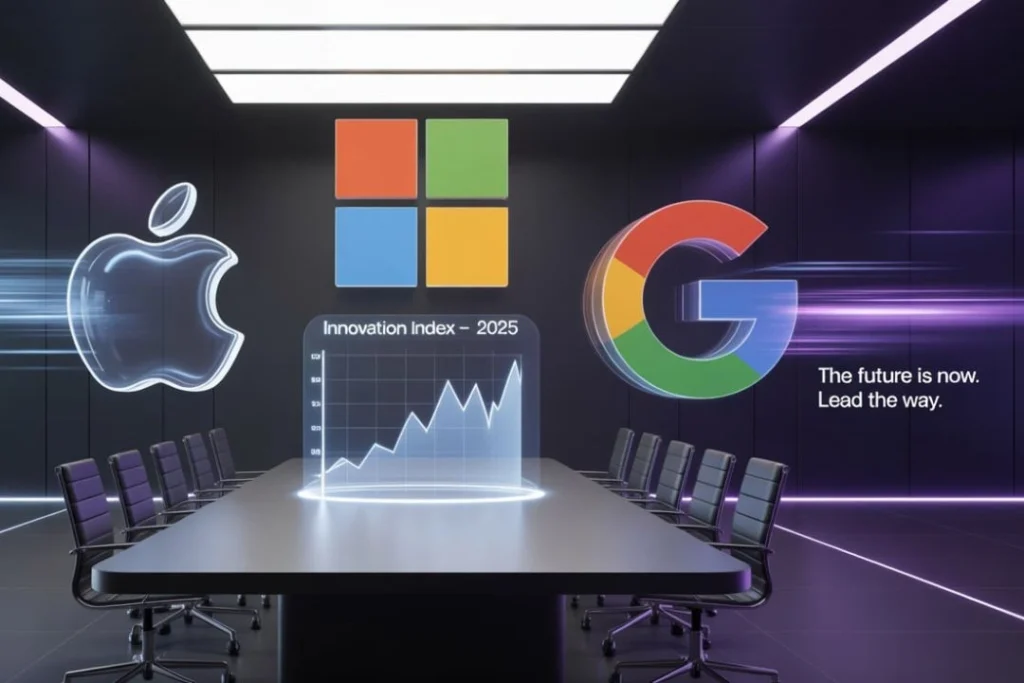The technology landscape in 2025 is defined by a fierce competition among the tech giants: Apple, Google, and OpenAI. These companies are not just shaping the future—they’re building it in real time. As AI becomes the driving force behind digital transformation, the question on everyone’s mind is: Who’s leading the race in 2025—Apple, Google, or OpenAI?
This in-depth look at the tech giants 2025 provides insights into their strategies, innovations, and market positions, using key trends and data to analyze who’s pulling ahead.
Apple: Merging AI with Ecosystem Strength
Apple’s approach to artificial intelligence has always been subtle yet powerful. In 2025, Apple is leaning into Apple AI advancements through integrations within its ecosystem—especially with Siri, iOS, and its chipsets like the M3 and A18.
Apple Technology 2025
Apple’s strength lies in seamless user experience. Apple technology 2025 shows major improvements in health tech, on-device AI processing, and privacy-focused machine learning. Its commitment to edge computing ensures that users benefit from Apple machine learning without sacrificing data privacy.
Apple and Generative AI
While Apple hasn’t yet released a public Apple GPT competitor, the company is rumored to be working on its own generative AI models. These would likely be optimized for on-device usage, possibly embedded in iPhones and Macs, further deepening Apple’s advantage in the hardware-software synergy.
Apple Innovation Trends
From AR/VR with the Vision Pro to AI-enhanced photography, Apple innovation trends suggest a focus on consumer-centered AI applications. While Apple may not be first to market with experimental tools, it consistently leads in delivering polished, usable tech.
Google: A Powerhouse of AI Innovation
When it comes to AI research and scalability, Google remains a dominant force. In 2025, the company continues to push boundaries via Google AI innovations 2025, including advanced work from DeepMind and its flagship AI model, Gemini.
Google AI 2025 and DeepMind Updates
Google DeepMind updates reveal continued strides in reinforcement learning, protein folding, and multi-modal AI. With Google Gemini vs GPT becoming a headline debate, Gemini’s performance in reasoning and multi-language processing is closing the gap with OpenAI’s models.
Google Technology Race
Google vs OpenAI is more than just a rivalry—it’s a clash of AI philosophies. Google, with its Alphabet tech investments, brings vast data resources, engineering power, and cloud infrastructure, giving it a solid foundation in the Google technology race.
Google vs Apple AI
In comparing Google vs Apple AI, Google clearly leads in open research and enterprise applications, while Apple excels in consumer-first privacy and integration. Apple vs competitors becomes a more nuanced discussion when innovation styles vary this significantly.
OpenAI: The Disruptive Force
In just a few short years, OpenAI has transformed from a research lab into a full-fledged AI powerhouse. The release of OpenAI GPT-5 in early 2025 marked a major leap in generative AI capabilities, cementing its role in shaping the AI race 2025.
OpenAI Progress 2025
OpenAI leadership 2025 is visible in industries from education to enterprise automation. ChatGPT and Codex continue to evolve, with multimodal interfaces and real-time reasoning becoming the norm. OpenAI’s impact on productivity, customer service, and software development is unmatched.
OpenAI vs Google Battle
The OpenAI vs Google battle intensifies as both release increasingly capable models. While Google focuses on versatility and integration with its platforms, OpenAI thrives on agility and developer engagement. ChatGPT vs Gemini is a neck-and-neck rivalry that’s driving innovation forward.
OpenAI’s Rise Among Tech Giants
Many wonder: Can OpenAI beat Apple and Google? With its narrow focus and massive user base, OpenAI market share continues to grow. The company’s API-first model enables fast integration into products and services, making it a central figure in AI leadership 2025.
Comparing Tech Giants: Who Leads in 2025?

Let’s compare the strengths of these leading tech companies 2025 across a few critical areas:
| Category | Apple | OpenAI | |
|---|---|---|---|
| Consumer AI | ✔️ | ✔️ | ✔️ |
| Enterprise AI | ❌ | ✔️ | ✔️ |
| Hardware | ✔️ | ❌ | ❌ |
| Innovation Speed | ⚖️ | ✔️ | ✔️ |
| AI Research | ❌ | ✔️ | ✔️ |
| Privacy Focus | ✔️ | ⚖️ | ❌ |
From the above, it’s evident that each company has carved a unique space. Apple’s role in future tech is deeply tied to hardware and UX. Google’s AI 2025 dominance comes from scalability and research. OpenAI’s rise among tech giants is driven by speed, disruption, and focus.
Business & Market Influence
Tech Market Share 2025
In terms of tech market share 2025, Apple still holds strong in hardware and app ecosystems, Google leads in data services and cloud, while OpenAI grows rapidly in SaaS and AI APIs.
AI Company Growth 2025
All three companies show signs of massive AI company growth 2025, but OpenAI’s trajectory is the steepest. Investors are paying attention to OpenAI leadership, while Google Apple OpenAI valuation comparisons show an increasingly tight race.
Disruptive Tech Companies
Among the most disruptive tech companies, OpenAI leads innovation, while Google refines and scales it. Apple disrupts through usability and user trust.
The Verdict: Who’s Winning in AI?
So, who is leading tech in 2025? There’s no one-size-fits-all answer. Each company is winning in different ways:
- Apple is redefining privacy-focused, integrated AI experiences.
- Google is maintaining dominance in research and global infrastructure.
- OpenAI is the face of generative AI and developer-first tools.
This technology leadership showdown will continue to evolve, but one thing is certain: the AI race Google Apple OpenAI is far from over.
What to Watch Going Forward
Keep an eye on:
- OpenAI breakthroughs and their applications in the enterprise.
- Google innovation 2025, especially with DeepMind and Gemini.
- Apple product roadmap 2025, particularly in health, AR/VR, and voice assistants.
As we continue into 2025, the future of Big Tech will be defined not just by who’s fastest, but by who’s most aligned with the future needs of consumers, enterprises, and society.


